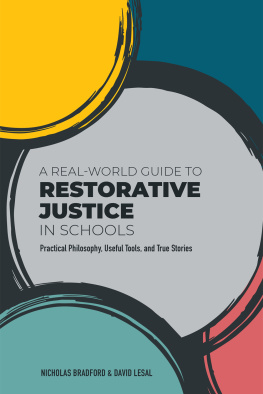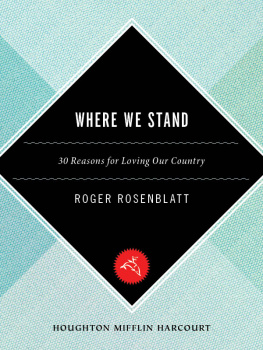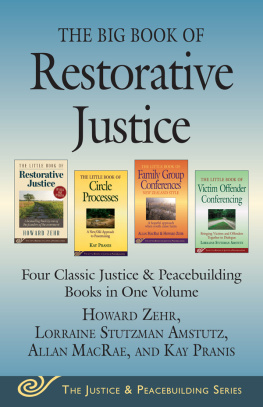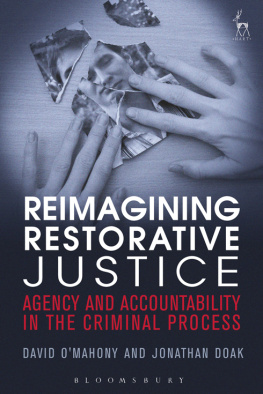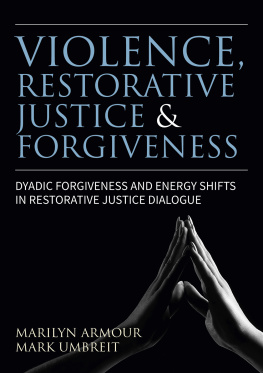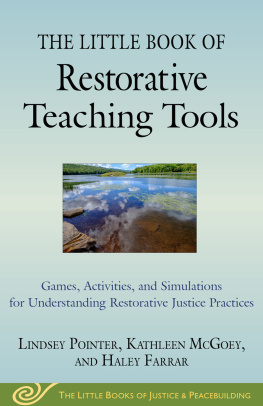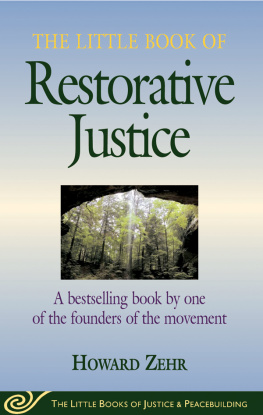Focusing on Great Britain, Rosenblatt offers the first empirical results on this subject, making it a must-read for anybody who is interested in the relationship between Restorative Justice and Communities. It should be on the bookshelf of any serious scholar in this area. The future lies in works like this.
Elmar G.M. Weitekamp, Ph.D., University of Tbingen, Germany
In The Role of Community in Restorative Justice, Rosenblatt confronts the mythology of government programs that claim to be restorative by exploring the concept of community more closely and examining how it is employed. She provides an excellent assessment and critique of how youth justice panels in the United Kingdom fall far short of meaningful community involvement. Her work will inspire others to scrutinize the implementation of restorative justice initiatives to ensure fidelity to its fundamental premises.
Ted Wachtel, President, IIRP Graduate School, USA
This book represents an important contribution to restorative justice scholarship by providing theoretically-informed and empirically-rich insights into the role of community in restorative practices. Rosenblatt gives us a nuanced and balanced appraisal of the restorative pretentions of youth offender panels in theory and in practice, as well as the benefits and challenges of engaging community members in such processes. The book will be of considerable interest and value to all those academics, policymakers and practitioners, both in the UK and beyond who are seeking to advance community involvement in dispute resolution and justice systems more generally.
Adam Crawford, Professor of Criminology and Criminal Justice, University of Leeds, UK
The Role of Community in Restorative Justice
Although restorative justice is probably one of the most talked about topics in contemporary criminology, little has been written about how community involvement in restorative justice translates into practice. While advocates have presented the community as an essential pillar of restorative justice, the rationale for why and how this is the case remains underdeveloped and largely unchallenged. This book offers an empirical and theoretical explanation of what community involvement means and what work it does in restorative justice.
Drawing on an empirical case study and the wider sociological literature, The Role of Community in Restorative Justice examines the involvement of the community in one selected practice of restorative justice, and also considers the implications of the English and Welsh experience for development of a more coherent framework for operationalising community involvement in restorative justice practices. It is argued that restorative justice programmes need to start from a more concrete and up-to-date notion of community. While operationalising community involvement, they need to acknowledge, all at once: the importance of place; the importance of family links, friendship and other social ties; and the importance of similar social traits and identities.
This book is essential reading for students, researchers and academics in the fields of criminology, criminal justice, sociology, community studies, policy studies, social policy and socio-legal studies. It will also be valuable reading for a variety of practitioners and policymakers, particularly working with restorative justice and youth justice.
Fernanda Fonseca Rosenblatt is an Assistant Professor in Law at the Catholic University of Pernambuco (UNICAP), Brazil, where she teaches Criminal Law and Criminal Procedure. Fernanda completed her DPhil in Criminology at the Centre for Criminology, University of Oxford, in January 2014. In 2005 she was awarded a Masters degree from the Catholic University of Leuven, Belgium. Fernanda is currently a member of the Executive Committee of the World Society of Victimology. She is also a member of the Asa Branca Research Group of Criminology (UNICAP, Brazil). Her areas of expertise are: Restorative Justice, Community (Justice), Youth Justice and Street Children.
Routledge Frontiers of Criminal Justice
1. Sex Offenders: Punish, Help, Change or Control?
Theory, policy and practice explored
Edited by Jo Brayford, Francis Cowe and John Deering
2. Building Justice in Post-Transition Europe
Processes of criminalisation within Central and Eastern European societies
Edited by Kay Goodall, Margaret Malloch and Bill Munro
3. Technocrime, Policing and Surveillance
Edited by Stphane Leman-Langlois
4. Youth Justice in Context
Community, compliance and young people
Mairead Seymour
5. Women, Punishment and Social Justice
Human rights and penal practices
Margaret Malloch and Gill McIvor
6. Handbook of Policing, Ethics and Professional Standards
Edited by Allyson MacVean, Peter Spindler and Charlotte Solf
7. Contrasts in Punishment
An explanation of Anglophone excess and Nordic exceptionalism
John Pratt and Anna Eriksson
8. Victims of Environmental Harm
Rights, recognition and redress under National and International
Matthew Hall
9. Doing Probation Work
Identity in a criminal justice occupation
Rob C. Mawby and Anne Worrall
10. Justice Reinvestment
Can the criminal justice system deliver more for less?
Chris Fox, Kevin Albertson and Kevin Wong
11. Epidemiological Criminology
Theory to practice
Edited by Eve Waltermaurer and Timothy A. Akers
12. Policing cities
Urban securitization and regulation in a 21st century world
Edited by Randy K. Lippert and Kevin Walby
13. Restorative Justice in Transition
Kerry Clamp
14. International perspectives on police education and training
Edited by Perry Stanislas
15. Understanding Penal Practice
Edited by Ioan Durnescu and Fergus McNeill
16. Perceptions of Criminal Justice
Vicky De Mesmaecker
17. Transforming Criminal Justice?
Problem-solving and court specialization
Jane Donoghue
18. Policing in Taiwan
From authoritarianism to democracy
Liqun Cao, Lanying Huang and Ivan Y. Sun
19. Reparation for Victims of Crimes against Humanity
The healing role of reparation
Edited by Jo-Anne M. Wemmers
20. Victims of Violence and Restorative Practices
Finding a Voice
Tinneke Van Camp
21. Long-Term Imprisonment and Human Rights
Edited by Kirstin Drenkhahn, Manuela Dudeck and Frieder Dnkel
22. Working within the Forensic Paradigm
Cross-discipline approaches for policy and practice
Edited by Rosemary Sheehan and James Ogloff
23. Positive Criminology
Edited by Natti Ronel and Dana Segev
24. InmatesNarratives and Discursive Discipline in Prison
Rewriting personal histories through cognitive behavioral programs in prison
Jennifer A. Schlosser
25. Municipal Corporate Security in International Context
Kevin Walby and Randy K. Lippert
26. Victims and Restorative Justice
Edited by Ivo Aertsen, Inge Vanfraechem and Daniela Bolivar
27. The Role of Community in Restorative Justice
Fernanda Fonseca Ronseblatt



